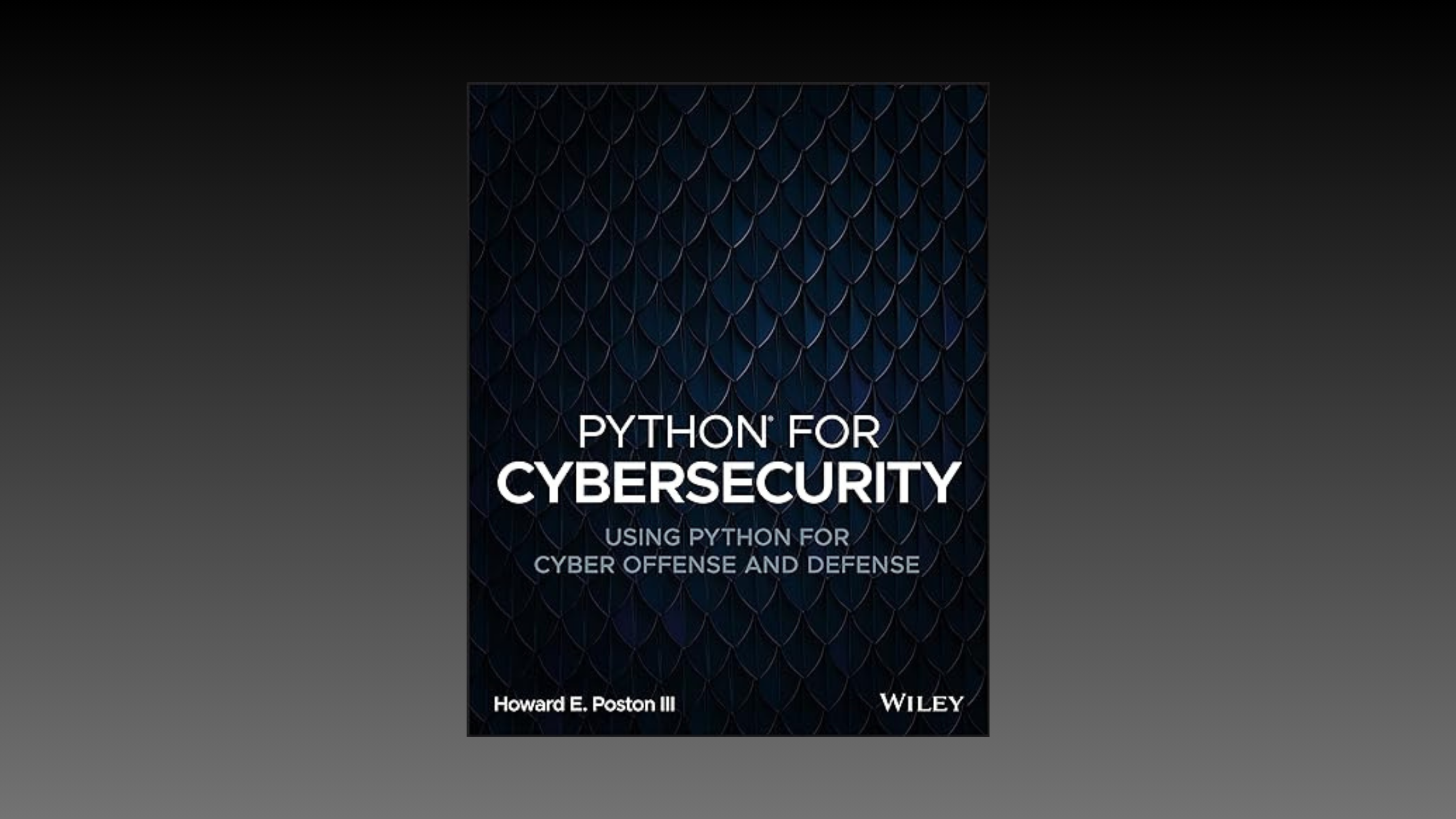Table of Contents
Python for Cybersecurity: Using Python for Cyber Offense and Defense 1st Edition
Author: Howard E. Poston III
Published date: March 2022
Premium
Product details
Publisher : Wiley; 1st edition (March 22, 2022)
Language : English
Paperback : 240 pages
ISBN-10 : 1119850649
ISBN-13 : 978-1119850649
Item Weight : 2.31 pounds
Dimensions : 7.3 x 0.8 x 9.2 inches
Book Description
"Python for Cybersecurity: Using Python for Cyber Offense and Defense" is an authoritative guide that explores the application of Python programming in the realm of cybersecurity. The book leverages the MITRE ATT&CK framework to structure its discussion of various cyberattack techniques, defensive strategies, and key challenges faced by network administrators and cybersecurity professionals. With downloadable sample code provided, the book aims to equip readers with the knowledge and skills necessary to utilize Python in a wide range of cybersecurity scenarios.
The book delves into the different stages of a cyberattack, including reconnaissance, resource development, initial access, execution, persistence, privilege escalation, defense evasion, credential access, discovery, lateral movement, collection, command and control, exfiltration, and impact. Each chapter provides in-depth discussions of multiple techniques and sub-techniques that attackers may employ to achieve their objectives in these various use cases.
Key Features
Comprehensive coverage of Python's application in cybersecurity, aligned with the MITRE ATT&CK framework
Detailed explanations of cyberattack techniques, defensive strategies, and key challenges faced by cybersecurity professionals
Downloadable sample code to facilitate hands-on learning and practical implementation
Real-world use cases and fully functional code examples demonstrating Python's capabilities in various cybersecurity domains
What You Will Learn?
By reading "Python for Cybersecurity," you will gain:
An understanding of how Python can be leveraged for both offensive and defensive cybersecurity purposes
Insights into the different stages of a cyberattack and the techniques employed by attackers
Knowledge of effective Python-based defenses against various cyberattack techniques
Practical skills in utilizing Python for tasks such as reconnaissance, vulnerability exploitation, lateral movement, command and control, data exfiltration, and more
Familiarity with real-world use cases and the application of Python in addressing specific cybersecurity challenges
Who this Book is for?
"Python for Cybersecurity" is an ideal resource for:
Cybersecurity professionals, including SOC analysts, penetration testers, and Chief Information Security Officers
Python programmers interested in exploring the cybersecurity applications of the language
Cybersecurity enthusiasts seeking a practical and in-depth understanding of Python's role in cybersecurity
Individuals with a professional or personal interest in the field of cybersecurity
About the Author
Howard E. Poston III is a freelance consultant and content creator specializing in blockchain and cybersecurity. With over a decade of experience in Python programming, he has developed and taught numerous courses on cybersecurity. Poston is a respected speaker on blockchain and cybersecurity topics at international security conferences, sharing his expertise with audiences worldwide.
Disclaimer: This page contains affiliate links. By making a purchase through these links, we may earn a commission at no extra cost to you. Visit Affiliate Program page for more details Thank you!
Python for Cybersecurity: Using Python for Cyber Offense and Defense 1st Edition
Author: Howard E. Poston III
Published date: March 2022
Premium
March 26, 2024
Navigating the Cybersecurity Career Path
"Navigating the Cybersecurity Career Path" provides a comprehensive guide for individuals looking to start, advance, and lead successful careers in the cybersecurity industry.
Essential Cybersecurity Science: Build, Test, and Evaluate Secure Systems
Essential Cybersecurity Science provides a practical guide for applying the scientific method to assess and improve the security of information systems.
Hands-On Artificial Intelligence for Cybersecurity
"Hands-On Artificial Intelligence for Cybersecurity" empowers readers with practical knowledge to develop intelligent systems that detect threats and fortify network security using AI.
Principles of Information Security (MindTap Course List) 7th Edition
"Principles of Information Security" provides a comprehensive understanding of information security concepts, practices, and strategies essential for students and professionals in today's digital landscape.
Learn Something New with Free Email subscription
Learn Something New with Free Email subscription
Subscribe
Subscribe
Subscribe
Subscribe
Navigating the Cybersecurity Career Path
"Navigating the Cybersecurity Career Path" provides a comprehensive guide for individuals looking to start, advance, and lead successful careers in the cybersecurity industry.
Essential Cybersecurity Science: Build, Test, and Evaluate Secure Systems
Essential Cybersecurity Science provides a practical guide for applying the scientific method to assess and improve the security of information systems.
Hands-On Artificial Intelligence for Cybersecurity
"Hands-On Artificial Intelligence for Cybersecurity" empowers readers with practical knowledge to develop intelligent systems that detect threats and fortify network security using AI.
Principles of Information Security (MindTap Course List) 7th Edition
"Principles of Information Security" provides a comprehensive understanding of information security concepts, practices, and strategies essential for students and professionals in today's digital landscape.
